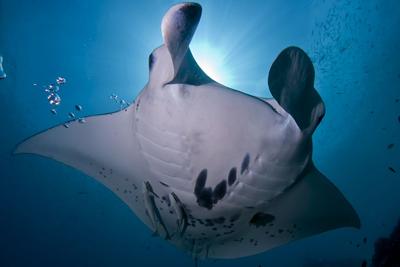Preserving ocean life. Manta ray conservation
Andrew Harvey graduated from Southampton with an MSc in Oceanography in 2004. His career has taken him around the world, from Antarctica to Madagascar and Indonesia, working with some of the world’s leading companies, including World Wildlife Fund (WWF), The Nature Conservancy, the US Government, and the Asian Development Bank.

In 2010 Andrew founded MantaWatch, a UK-based marine conservation company that is applying cutting-edge web technologies to conserve threatened manta rays. In 2013, his team managed the creation of a 7,000 km2 manta ray and shark sanctuary in eastern Indonesia. In March 2014, his organisation played an instrumental role assisting the Government of Indonesia to declare the world’s largest manta ray sanctuary.
This new legislation will provide full protection to manta rays throughout south east Asia’s biggest country, which for years has been the world’s largest shark and ray fishery. The sanctuary will span an incredible area of almost 6 million square kilometres.
Killing and harming of both oceanic and reef manta rays, as well as trading of manta ray body parts, is now illegal across Indonesia. “Indonesia now has the second-largest manta ray tourism industry in the world, with an estimated annual turnover of $15m,” says Agus Dermawan, a senior official from Indonesia’s Ministry of Marine Affairs and Fisheries. “Given the huge area of reefs and islands in our country, if managed properly, Indonesia could become the top manta tourism destination on the planet.”
Divers, snorkelers and ocean lovers have helped to protect manta rays in Indonesia by submitting their manta sightings and photos to Andrew’s company, MantaWatch, through its online manta tracking application, providing critical data to the government. “This is a great example of how governments and the diving industry can work together to achieve positive impacts for the environment and the economy,” says Andrew.
MantaWatch also supported the creation of the 7,000km2 West Manggarai and Komodo manta ray sanctuary, one year after the Raja Ampat regional government declared the first manta ray sanctuary in the Coral Triangle.
Andrew commented “Indonesia now faces the new challenge of effectively managing its manta rays, and enforcing the new regulations when necessary. Urgent research is needed to inform management planning by answering critical questions, such as how many mantas inhabit Indonesia’s waters, where the important migratory corridors and habitats are for feeding and breeding, and whether mantas migrate across Indonesia’s borders, where they may be at risk in the unprotected waters of neighbouring countries.”
MantaWatch has recently signed a collaborative agreement with Indonesia's Institute of Sciences and the University of Queensland, to research Manta spp. and Mobula spp. distribution and population connectivity between nations in SE Asia and The Coral Triangle region.
Andrew adds: “We will be utilising a sophisticated suite of cutting-edge technologies and methodologies, including satellite tracking, genetic sequencing, photographic identification and citizen science. We are always interested to connect with researchers and/or postgraduate students with similar interests, and hope that some of these projects may align with the interests of Southampton Masters or PhD students.”
MantaWatch protects threatened manta rays through the application of technology and education to support local conservation actions. The company launched the world’s first social web application dedicated to open, transparent and participative marine conservation, enabling anyone to play an important role in monitoring and protecting manta populations by simply visiting www.mantawatch.com. They also run the annual MantaWatch Internship Program—a professional manta ray research and conservation training program for students in developing countries. MantaWatch is a not-for-profit marine conservation company based in London, United Kingdom.
Follow MantaWatch on Twitter:@mantawatch
Find out more about MantaWatch